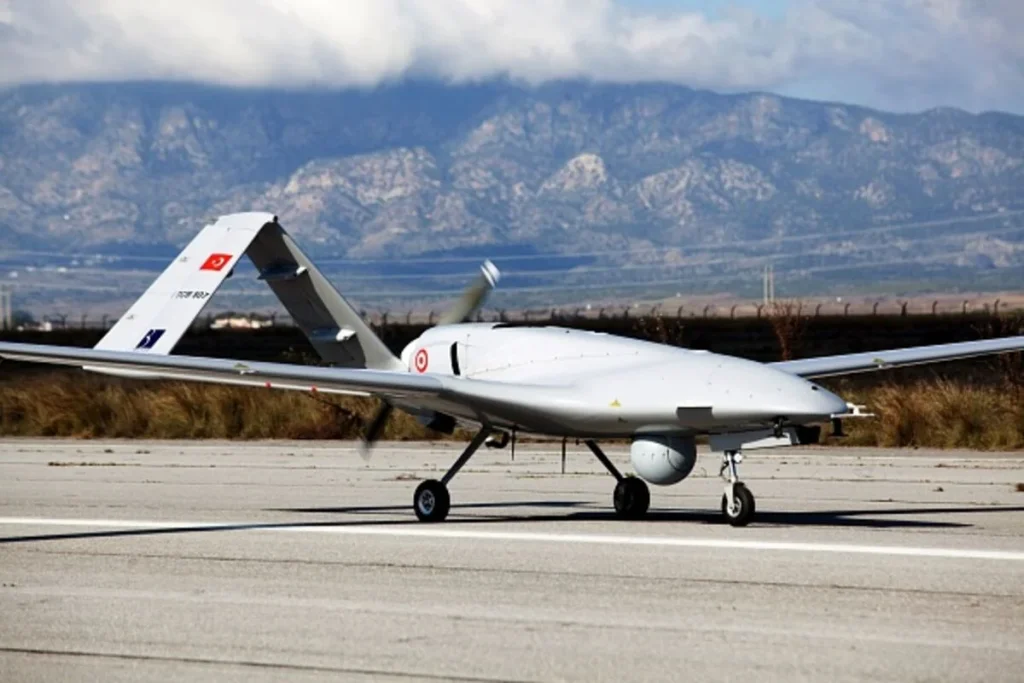As Russian forces conducted exercises near Ukraine’s border in late 2021, with an estimated 100,000 troops amassed, Turkey escalated its military support for Ukraine by supplying Bayraktar TB2 armed drones, despite Moscow’s warnings.
The New York Times reported on February 3, 2022, that Turkish President Recep Tayyip Erdogan agreed to expand these supplies, a move seen as a rebuke to Russia, complicating the delicate balance of Turkey’s relations with Moscow.
Asli Aydintasbas, a senior fellow at the European Council, noted, “Turkey is not happy about Russian expansion… Ankara is seeing this as an opportunity to improve relations with NATO,” leveraging the crisis to strengthen ties with Western allies amid strained U.S. relations.
Bayraktar TB2’s Proven Impact
The Turkish-made Bayraktar TB2 drones, produced by Baykar Technologies, gained global attention for their cost-effective precision strikes, costing approximately $2 million each compared to $20 million for U.S. Reaper drones.
Their success in conflicts like Nagorno-Karabakh in 2020, where they destroyed Armenian tanks and air defenses, and in Ethiopia against Tigray rebels in 2021, highlighted their battlefield prowess.
Defense analyst Arda Mevlutoglu emphasized their capability: “A single armed drone equipped with a couple of bombs may destroy a whole air defense battery or a very expensive electronic warfare system.”
However, he cautioned that Russia’s sophisticated air defenses, including systems like the Pantsir-S1 and Krasukha-4, posed a significant challenge compared to weaker defenses in Syria, Libya, or Nagorno-Karabakh.
Ukraine’s Tactical and Psychological Edge
Ukraine’s first combat use of the TB2 on October 26, 2021, against Russian-backed separatists in Donbas, destroyed a D-30 howitzer, boosting morale. Petro Burkovskiy from the Democratic Initiatives Foundation in Kyiv stated, “That October drone attack increased morale not only in the Ukrainian army but also in the general public.”
The strike, following separatist shelling that killed a Ukrainian soldier, demonstrated Ukraine’s ability to resist Russian aggression, with Turkey emerging as a visible ally.
Ukraine had purchased six TB2s in 2019 for $69 million and planned to acquire 24 more, alongside establishing a joint production facility with Baykar, signaling deepening defense ties.
Russia’s Condemnation and Turkey’s Balancing Act
Russia condemned the drone strike, with President Vladimir Putin calling it “destructive” and “provocative” in a December 2021 call with Erdogan, per the Kremlin.
Dmitry Peskov, Kremlin spokesman, warned on October 27 that such deliveries could “destabilize” Donbas. Turkey, a NATO member reliant on Russian gas and cooperation in Syria, faces a delicate balance.
Professor Mustafa Aydin of Kadir Has University noted, “If Turkish-made drones end up causing Russian casualties, bilateral ties could face a big challenge.” Erdogan’s mediation efforts, including hosting peace talks in Istanbul by March 2022, aimed to avert escalation and avoid choosing between NATO and Russia.
Context Amid Global Tensions
The drone sales coincided with heightened global concerns over Russia’s intentions, with U.S. intelligence warning of a potential invasion involving 175,000 troops.
Ukraine also received Javelin anti-tank missiles from the U.S. and UK, with former Ukrainian defense minister Andriy Zahorodniuk stating that Ukraine had more anti-tank missiles than Russia had operational tanks, enhancing deterrence.
The Covid-19 pandemic, with over 250 million global cases by November 2021, added complexity, as did regional developments like Ghana’s Olympic boxing success and vaccination mandates for football fans.
Turkey’s drone exports, while commercially driven by Baykar, a private company tied to Erdogan’s family, underscored its strategic pivot toward NATO and Ukraine, despite Moscow’s objections.






